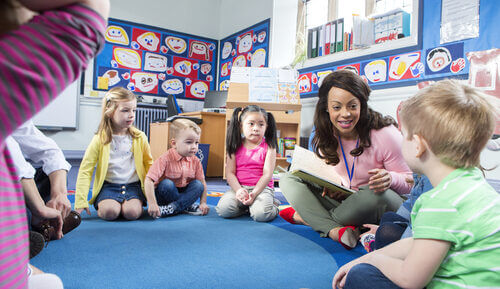
Many parents want to know what are the top benefits of nursery. There are over 14,000 nurseries in the UK caring for children from the age of six weeks up to five-years-old. But why should children go to nursery?
Why should children go to nursery?
Many parents put their children in nursery so they can return to work knowing their child is safe and cared for. There are also huge benefits for the child, including social interaction with their peers, learning new skills and boosting their independence and confidence.
What are the benefits of nursery?
Here are 10 advantages of nursery.
1. Helps children achieve early years milestones
- Nurseries follow an early years curriculum to help children reach milestones as they grow.
- Research by the University of London showed children who spent three years or more in nursery education could advance their academic attainment by up to a year. This is compared to children whose parents kept them at home until the age of five-years-old.
- Children can benefit from the government’s early years developmental goals.
– The curriculum in England is called the Early Years Foundation Stage (EYFS).
– It sets goals for the learning and development of children aged from birth to five-years-old. Every registered nursery and preschool in England is required to follow EYFS.
– The areas of learning are communication and language; physical development; personal, social and emotional development; literacy; mathematics; understanding the world and expressive arts and design.
- Scottish nurseries follow the Curriculum of Excellence.
– This is focused on language and literacy; mathematics and numeracy; science; social studies and technology; health and wellbeing; expressive arts; religious and moral education.
- Welsh nurseries follow the Foundation Phase Framework and the Curriculum for Wales.
– This covers personal and social development, wellbeing and cultural diversity; language, literacy and communication skills; mathematical development; Welsh language development; knowledge and understanding of the world; physical development and creative development.
- Northern Ireland’s nurseries follow Curricular Guidance for Pre-School Education .
– This covers personal, social and emotional development; physical development and movement; language development; early mathematical experiences; the arts and the world around them.
Dad, Martin, whose child attends a nursery in Manchester said: “Enrolling our children into nursery was probably the best decision we’ve made as parents.
“The care and attention they get it second to none and their development has come along leaps and bounds.”
2. Supports children’s physical development
- A benefit of nursery is that children are able to play games with peers and get involved in physical play. This helps children develop muscle control, coordination, stamina core strength, stability, balance, spatial awareness and agility.
- Nurseries give children access to planned outdoor activities e.g. physical activities such as kicking balls, dancing, yoga. This may involve gross motor skills such as jumping, running, hopping, climbing etc.
- Children develop gross motor skills which lay the foundations for developing healthy bodies as well as social and mental wellbeing.
- Nurseries help children develop fine motor skills which involves small muscles working with the brain and nervous system to control movements in hands, fingers, lips and eyes. Developing fine motor skills helps children do things like manipulating objects, eating, writing and getting dressed.
3. Children can interact and socialise with other children
- Children are able to make new friends which can boost their wellbeing. Children get the chance at nursery to have lots of fun with other children their own age. This is particularly beneficial for children who have no siblings and whose family life is surrounded by adults.
- Children can learn to get on with other children with different personalities and backgrounds and can learn from other children’s behaviour.
- Young children can learn social skills at nursery such as sharing, empathy, politeness, cooperation, teamwork, understanding, kindness, communication. This is also part of the EYFS goal of personal, social, and emotional development.
4. Nurtures children’s emotional development
- Children learn about social best practices used in society. They learn about ‘right’ and ‘wrong’, kindness, empathy, understanding, sharing and patience. They do this with the support of nursery staff which boosts their emotional intelligence.
- Children are supported by trained staff to understand, express and talk about feelings. This helps their mental health and wellbeing.
- Promoting resilience: Nursery chidren socialise and practise concepts such as sharing with other children. They can even quarrel with another child. This promotes resilience in children as they go through potentially challenging emotional experiences.
- Children are given freedom at nursery to make choices and decisions about how they play which promotes independence.
- Risk-taking: At nursery children can safely take risks such as trying physical challenges like climbing, using tools like scissors, knives to cut vegetables. This builds up their confidence. Activities that promote bravery such as climbing can also build resilience when things go wrong e.g. falling over.
- A nursery’s routine, structure and regular schedule and rules encourages discipline amongst children.
- Nurseries inspire children to live a naturally healthy lifestyle that builds confidence, independence and self-motivation.
5. Children’s personal development
- Young children can receive potty training with the support of nursery staff. They are also encouraged to follow good hygiene practices such as washing their hands and brushing their teeth.
- Nursery staff also teach children how zip up their coats and how to pour water into a cup at snack time.
6. Helps children understand the natural world
- Children are exposed to the great outdoors at nursery and learn about nature and the environment. This also ties in with, for example, England’s EYFS goal for children to understanding the world.
- Many nurseries have forest schools or beach schools which exposes children to lots of fresh air, outdoor activity in the woods, beaches and other natural landscapes.
- Some nurseries have their own vegetable patches to grow their own healthy food for children to eat. Other nurseries are linked to farms which gives children the chance to see and interact with animals.
- Nursery staff strive to nurture an appreciation and respect for nature and the planet amongst children. Sustainable practices such as recycling and litter picking can also educate children about environmentally-friendly practices.
7. Access to learning resources they may not have at home
- Another benefit to nursery is that learning resources such as daily visits to a farm or beach, an onsite vegetable patch or even a garden to play in are often available. This may be difficult for children to access at home if they for example live in the middle of a city, in a high rise flat or where space is limited.
- A nursery can give a child the chance to access a wide range of diverse toys, books, play equipment, landscapes, experiences and activities such as messy play which they may not have available at home.
- Trained and experienced staff respond to your child’s individual needs.
A mum, whose child attends a nursery in Swansea, Wales, said: “My son is in preschool and has loved every day. I’ve really observed an increase in his command of numbers and letters recently, and love hearing him talk about the more extra-curricular classes he enjoys so much such as ballet and outdoor learning.
“They even had cycling lessons recently. The facilities are excellent too, such as the interactive whiteboards and new outdoor play equipment. I also really appreciate the journal of his learning formed via online and app platforms.”
8. Builds children’s immunity
- Nursery gives children a chance to catch colds etc from each other which makes them healthier and more robust when it comes to fighting infections later when they go to school. Their immune system has been exposed to more infections from other children in a nursery environment, than would be the case if they were at home.
9. Preparing for lifelong learning and school readiness
- Children share rhymes, songs, stories, and play games to develop their speaking and listening skills (literacy).
- At nursery, children are encouraged to learn to listen carefully, to develop concentration and to respond to questions and instructions to share ideas and experiences, and to take part in conversations.
- Children learn about routine and structure with help from a regular schedule in a nursery day. Children learn about discipline. This prepares children for life-long learning.
- Nursery gets children ready for the next big step in life – going to school. Nursery children are equipped to deal with leaving home each day to attend school and have an understanding of how to behave in school.
10. Parents get a break
- Parents are more relaxed after having a break from their children, which benefits children too.
- Nursery children are busy but relaxed and seem happy and purposeful.
- Nursery helps children understand that they can trust and bond with other people other than their parents.
Mum of twins, Lauren, who sent her children to a Berkshire nursery, said: “My twins have thrived since going there [to nursery].
“They were suffering from separation anxiety at first as they had not had much social interaction before due to being lockdown babies and the cost of paying double for baby groups.
“The relaxed atmosphere …and the patience of the staff meant my twins have now settled well and love going to nursery, they are thriving and have grown massively in confidence.
“It gives me great piece of mind to know that my children are happy and well looked after while I’m sleeping after a very busy night shift in A&E!”
Parents can also read this advice article to find out when is the right time to start nursery.


